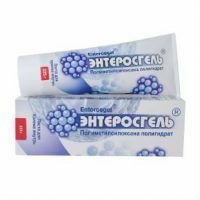
Enterosgel is a medicinal product intended for removing toxins from the body, normalizing the microbiocenosis, restoring the epithelium of the mucosa and other body tissues. Enterosorbent, like its cheaper analogs, has a detoxification, enveloping and anti-diarrhea effect. It suppresses the manifestations of dysbacteriosis and toxicosis, restores the disturbed intestinal microflora, stimulates its peristalsis, improves the functionality of the liver, intestines and kidneys.
- enterosorbent
- substitutes
- Atoxil
- Laktofiltrum
- Polysorb
- Polyphepanum
- Smekta( diosmectite, neosmectin)
- activated charcoal( Karbopekt, Sorbeks, Ultra-adsorption)
- Fosfalyugel
- Enterol
- Enterofuril( nifuroxazide, Ekofuril, ersefuril, Mirofuril, Adisord)
Enterosgel
The sorbent is available as a sweet paste for oral administration and a hydrogel for the preparation of a suspension based on polymethylsiloxane polyhydrate.
Enterosgel is widely used in allergology, gastroenterology, gynecology and obstetrics, nephrology, pediatrics. The drug is prescribed for adults and children as a detoxification agent for the following pathologies:
- Chronic and acute intoxications of various etiologies.
- Acute intestinal infections of various etiologies.
- Acute poisoning with poisonous and potent substances.
- Purulent-septic pathologies, which are accompanied by severe intoxication.
- Purification of the intestine after treatment of worms.
- Diseases of the gastrointestinal tract( gastritis, enterocolitis, diarrhea, heartburn, colitis, stomach and duodenal ulcer, dyskinesia, post-resection syndrome, and so on).
- Hyperbilirubinemia( viral hepatitis C).
- Drug and food allergy.
- Chronic renal failure( including pyelonephritis, kidney stone disease, glomerulonephritis, polycystosis, and so on).
- Prevention of chronic intoxication in people whose work is associated with harmful production.
- SARS, cold.
- Dysbacteriosis after course of treatment with antibiotics.
- Metabolic disorders.
- Skin diseases( diathesis, acne, neurodermatitis, dermatitis, acne, urticaria and others).
- Oncological diseases( for detoxification during and after radiation and chemotherapy).
- Toxicosis of pregnant women.
- Some women's diseases( thrush and others).
Side effects: constipation, nausea, with severe renal failure, a feeling of disgust towards the sorbent.
Substitutes
There are no complete analogs to the drug, but there are other agents from the group of enterosorbents, the principle of action of which is similar to Enterosgel.
to contents ^Atoxyl
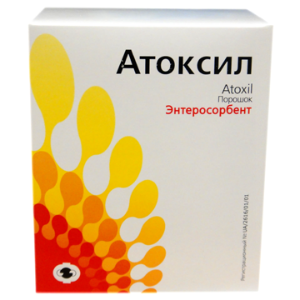
Produced in powders for the preparation of a suspension;active ingredient is silicon dioxide.
Enterosorbent IV generation has a detoxification, bacteriostatic, antiallergic and antimicrobial effect. It is used for the prevention and treatment of acute intestinal diseases accompanied by diarrhea, allergic diseases( atopic dermatitis, diathesis), food poisoning( alcohol, fungi and so on), purulent and burn lesions, trophic ulcers.
Before use, the powder should be dissolved with water according to the instructions. Recommended dosage for adults and children from 7 years - 12 grams, if necessary, increase the dose to 24 grams per day. Multiplicity of reception - 3-4 times. Duration of therapy for acute intestinal infections is 3-5 days, viral hepatitis - 7-10 days.
Side effects: constipation, allergic reactions.
Lactofiltrum
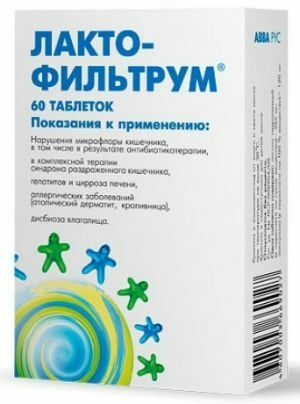
Produced in tablets;active ingredients - hydrolysis lignin and lactulose.
Combined drug containing both sorbent and prebiotic. The sorbent has the property of binding toxic substances that came from outside and originated in the body in the process of its vital activity, and the prebiotic creates comfortable conditions for the increase and multiplication of beneficial bacteria of the intestinal microflora. Due to this, the sorbent stimulates local immunity, which has a beneficial effect on the general state of the body. Lactofiltrum, like Enterosgel, is used for irritable bowel syndrome, dysbacteriosis, colitis of various genesis, disorders of stools, and so on.
Tablets are taken 1 hour before meals and other medications. Adults and children over 12 years of age are prescribed 2-3 tablets up to 3 times a day;children 8-12 years - 1-2 tablets three times a day;3-7 years - 1 tablet 3 times a day;1-3 years - 0.5 tablets three times a day. The average duration of therapy is 2-3 weeks.
Side effects: vomiting, nausea, allergic reaction.
Polysorb
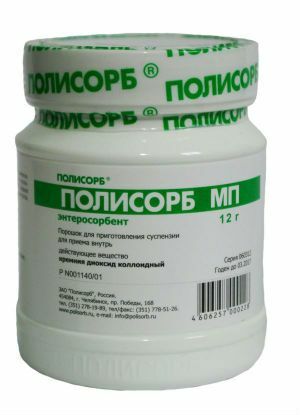
Available in powder for suspension;active ingredient - silicon colloidal dioxide.
Refers to broad spectrum enterosorbents that bind various microorganisms and toxic substances when passing through the organs of the digestive system.
Polysorb is allowed to be taken only in diluted form. To do this, you need to mix the necessary dose of the medicine into 0.5 glasses of warm water. Before each intake, a fresh suspension should be prepared and taken 1 hour before meals or other medications.
Adult sorbent is prescribed in an average daily dose of 0.1-0.2 grams / kg body weight( 6-12 grams).Multiplicity of admission - up to 4 times a day. The maximum daily dose is 0.33 grams / kg body weight( 20 grams).The daily dose for children depends on weight.
The duration of therapy depends on the severity of the disease. With acute intoxication - 3-5 days;chronic and allergic pathologies - up to 10-14 days. After 2-3 weeks, the course is recommended to be repeated.
Side effects: constipation, allergic reaction.
Polyphepan
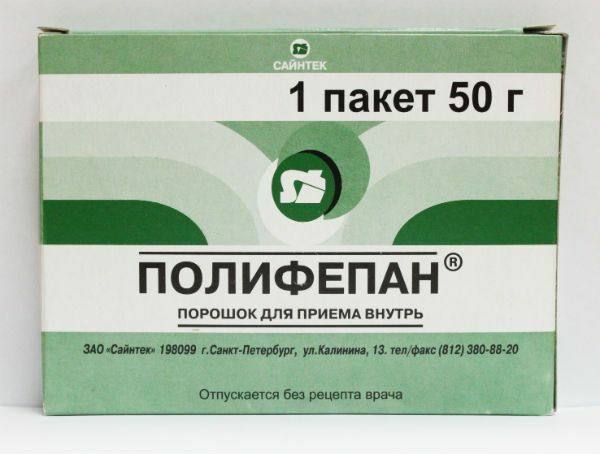
Available in powder, granules, tablets;active substance - lignin hydrolyzed.
Enterosorbent, used as a detoxifier for poisoning, intoxications and so on.
The drug is administered orally 1 hour before meals and other medications. The powder should be premixed in 50-100 milliliters of water. The dose of Polyphepan depends on the severity of the patient's condition and is 0.5-1 g / kg body weight per day in 4 divided doses. Duration of therapy for acute conditions 5 days, with chronic intoxication and allergy - up to 14 days.
Side effects: constipation, allergic reaction.
Smecta( Diosmectite, Neosmectin)
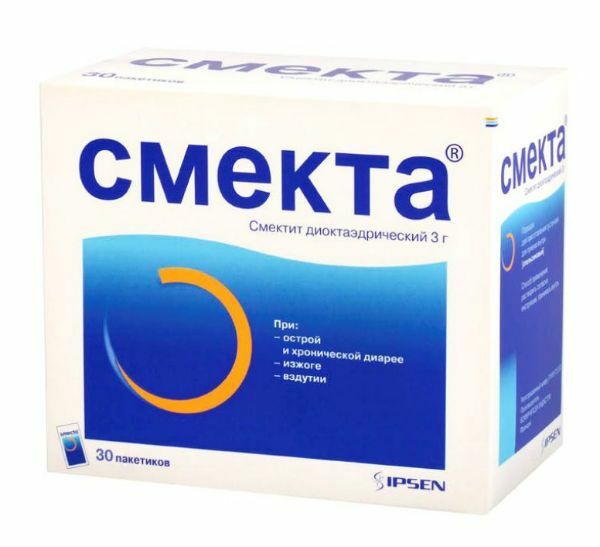
Produced in powders;the active substance is smectite dioctahedral.
In contrast to Enterosgel, Smecta does not have such a broad spectrum of action: it is an antidiarrhoeal drug that is used for chronic and acute diarrhea of various origins and for symptomatic treatment of bloating, heartburn as part of complex therapy.
The powder should be dissolved in a 0.5 glass of water, stirred and distributed for 3 divided doses. In acute diarrhea, adults are prescribed 6 packets per day;children under 1 year - 2 bags per day for 3 days, after that 1 packet per day;over 1 year - 4 packages per day for 3 days, then 2 packages per day. With discomfort and bloating, adults need to take 3 packs a day;children under 1 year - 1 package per day, 1-2 years - 1-2 packages per day;over 2 years - 2-3 packages per day. The duration of therapy, depending on the patient's condition, varies from 3 to 7 days.
Side effects: constipation, allergic reaction in the form of rashes, hives, itching.
Activated carbon( Carbopect, Sorbex, Ultra-Adsorbent)
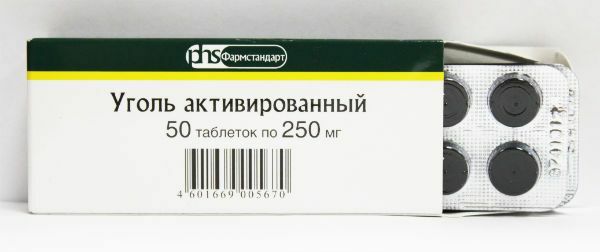
Produced in tablets;active substance - activated fine-pored amorphous carbon.
Due to detoxification and enterosorbiruyuschim qualities the drug effectively eliminates the signs of intoxication of the body in food, alcohol, drug poisoning. It is also used to reduce gassing in preparation for endoscopic and radiographic studies.
Dosage is calculated individually: 10 kilograms of body weight - 1 tablet of the drug( 250 milligrams) - 2-3 times a day. To increase the absorbent area of coal, it is recommended that the tablets be crushed before consumption and diluted in a small amount of cool water.
Side effects: diarrhea, constipation;with prolonged admission - a violation of absorption from the digestive tract of nutrients, hypovitaminosis.
Phosphalugel
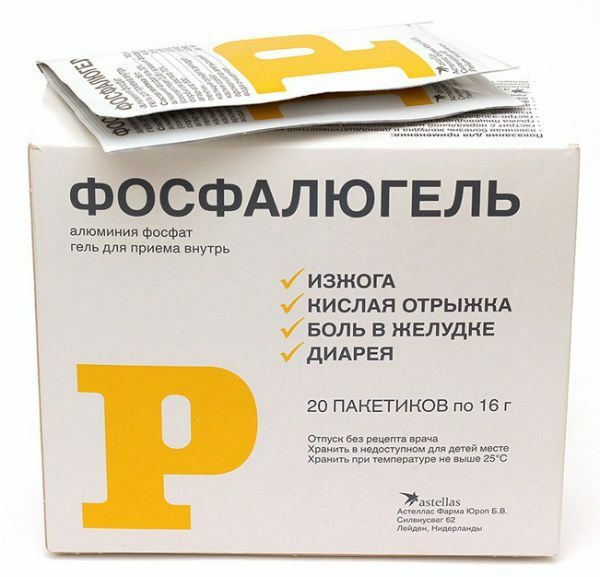
Produced in the form of a gel;active substance - aluminum phosphate gel 20%.
The drug has a triple therapeutic effect - anatacid, enveloping and sorbing. In addition, the drug has an analgesic effect. As an antacid drug, phosphalugel binds hydrochloric acid in the stomach and reduces the increased acidity of gastric juice, which is often observed with peptic ulcer, gastritis and so on. Also, the drug envelops the skin of the stomach, protecting it from the negative effects of digestive juice. The sorbing effect of Phosphalugel allows the agent to bind and remove harmful substances and various pathogenic microorganisms located in the lumen of the intestine.
The main indications for the use of the drug are: gastritis, gastric and duodenal ulcers, hiatal hernia, non-ulcer dyspepsia, reflux esophagitis, functional diarrhea, intestinal and gastric disorders caused by intoxication, medication, alcohol, irritants, acids).
Fosfalugel adults and children older than 6 years are prescribed orally 1-2 packages 2-3 times a day;from 1 year to 6 years - 0.5 packs up to 4 times a day;up to a year - up to ¼ of the package up to 6 times a day. The drug is recommended to be taken after meals in pure form or previously diluted in 100 milliliters of water.
Side effects: constipation.
Enterol
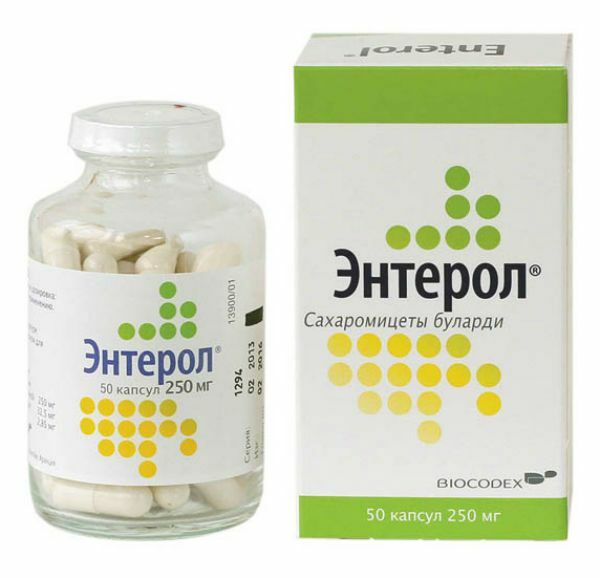
Available in capsules, powders;active ingredient - lyophilized bacteria Saccharomyces boulardii.
An antidiarrhoeal drug that regulates the balance of intestinal microflora, is used to treat and prevent diarrhea of various etiologies.
Enterol is prescribed for adults and children from the age of 3 1-2 capsules twice a day for 7-10 days. Children from 1 to 3 years are prescribed 1 capsule 2 times a day. It should be taken 1 hour before meals and washed down with water. For small children or in case of difficulty swallowing, the capsule should be opened and given its contents with a little warm water.
Side effects: manifestations of individual sensitivity to the components of the drug.
Enterofuryl( Nifuroxazide, Ekofuril, Ersefuril, Mirofuril, Adisord)
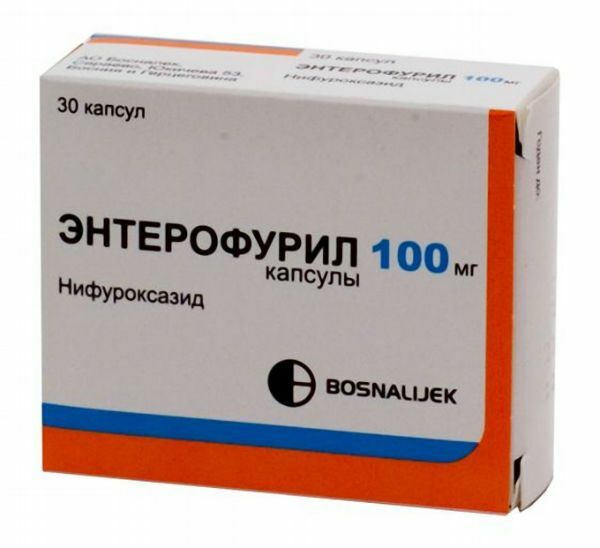
Available in capsules, suspensions;the active substance is nifuroxazide.
is an intestinal antiseptic, a broad-spectrum antidiarrhoeic that has the ability to kill pathogenic microorganisms in the lumen of the intestine and, thus, arresting diarrhea. Enterofuril, like Enterosgel, is prescribed for acute intestinal infections and diarrhea, provoked by various bacteria.
For adults and children over 7 years of age, the drug is prescribed in capsules up to 800 milligrams per day. Suspension is prescribed to children according to the instructions, depending on the age. The duration of treatment is no more than 7 days.
Side effects: urticaria, rash, anaphylactic shock, Quincke's edema, vomiting, nausea.
